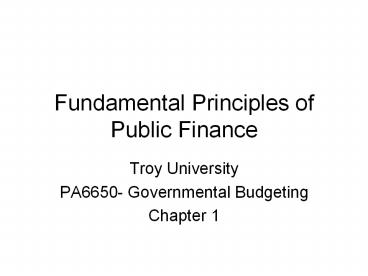Fundamental%20Principles%20of%20Public%20Finance - PowerPoint PPT Presentation
Title:
Fundamental%20Principles%20of%20Public%20Finance
Description:
Fundamental Principles of Public Finance Troy University PA6650- Governmental Budgeting Chapter 1 What s the Difference Between Public and Private Sector? – PowerPoint PPT presentation
Number of Views:253
Avg rating:3.0/5.0
Title: Fundamental%20Principles%20of%20Public%20Finance
1
Fundamental Principles of Public Finance
- Troy University
- PA6650- Governmental Budgeting
- Chapter 1
2
Whats the Difference Between Public and Private
Sector?
- Similarities Differences
- Sources of funds
- What funds get spent on
- Decision making
- Oversight and management control
- Legal issues
- Freedom of information
- Measure of success
3
Why Do Governments Exist?
- Governments make rules for markets
- Governments enforce rules
- Governments provide public goods
- WHY?
4
Market Failure
- Governments exist to provide valuable services
that businesses or individuals are unwilling or
unable to provide independently
5
The Tragedy of the Commons
- New England 1600s
- Grazing of animals in the town square
- Commons were overgrazed and destroyed
- Can you think of a similar situation today?
6
The Elements of Nonappropriability
- Concepts
- Exhaustion or Rivalry
- Exclusion
- Alternate use and joint use
- 2 big questions
- Is the exclusion of the goods feasible?
- Is consumption individual or joint?
7
4 Categories of Resources
PRIVATE GOODS Food Clothing TV Sets (alternate use, exclusion feasible) TOLL GOODS Turnpikes Toll bridges Motion pictures (joint use, exclusion feasible)
COMMON-POOL RESOURCES Aquifers Fishing grounds Petroleum reserves (alternate use, exclusion not feasible) PUBLIC GOODS National defense System of justice Vector control (joint use, exclusion not feasible)
8
Nonappropriability
- Nonexhaustion/nonrivalry (air
- Free Riders
9
Externalities
- Positive and Negative Unintended Consequences
- Good outcomes
- Vaccines result in less exposure to those who
have not been innoculated) - Bad outcomes
- (alligators in the swamp after draining)
10
Failure of Competition
- Incomplete markets / imperfect information
- Government testing of drugs, flood insurance
- Adverse selection (HMOs rejecting cancer clients)
- Moral hazard (flood insurance to those in flood
zones) - Economic stabilization
- Preventing unemployment, inflation
- Increasing standard of living
- Redistribution
- Corrects perceived injustices
11
Privatization
- Arguments supporting
- Smaller government
- Operating efficiency and response to clients
- Cash
- Arguments against
- Loss of government capability
- Possible monopolistic manipulation
12
Government Production Government Provision
Government Provision with Government Production Government Provision with Private Production
Private Provision with Government Production Private Provision with Private Production
13
Building Social Decisions from Private Preferences
- Public choice theory individuals are the best
judges of their own well being - The welfare of the community depends upon the
welfare of individuals in that community - Pareto Principle If at least one person is
better off from a policy action and no person is
worse off, then the community as a whole is
better off and the action should be taken - Tale of 3 projects Pages 17 and 18
14
Political Science
- Difference between liberal and conservative?
- Differences between capitalist, socialist, and
communist?
15
Politics, Representation, and Government Finance
- Parties dont know what citizens want
- Citizens dont know what government has done
- There is an overall scarcity of knowledge
16
Politics, Representation, and Government Finance
- Some people are more politically important than
others - Specialists appear
- Imperfect information results in bribery
- Voters make uninformed choices
17
The Layers of Government
- Express Powers
- Implied Powers
- Tenth Amendment
- Dillon Rule / Home Rule
- Hierarchy of Power
18
Political Science Quiz
- Republic
- Democracy
- Representative Democracy
- Unitary government
- Source of federal power
- Source of state power
- Source of local power
19
Do You Know Your Government
- Cabinet members
- Vice President / Speaker of House
- U.S. Senators
- U.S. Representatives
- Supreme Court Justices
- Other agencies
20
Conclusion
- Why do governments exist?
- What are the objectives of governments?
- What are the results of our system of government?
- How are federal/state/local governments
constrained?































